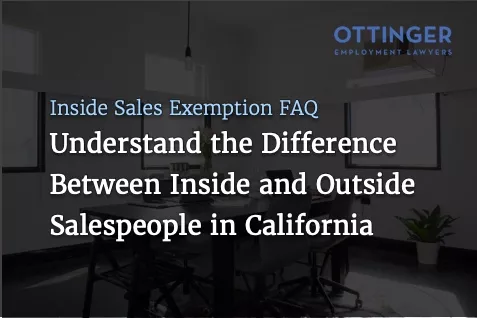Zoom and the Inside Sales Exemption
The Coronavirus pandemic is forcing rapid change on the way we work and some of those changes might stick.
Zoom meetings, for example, are replacing business trips while travel is restricted.
But will the convenience and efficiency of online meetings reduce business travel once the restrictions are lifted?
Why travel to see prospects when you can meet them online for a fraction of the cost?
If this becomes a lasting change in business behavior, it could have serious legal implications for sales teams.

The Distinction Between Inside and Outside Sales in California
In California, there is an important legal difference between inside and outside salespeople. Inside salespeople have more rights than outside salespeople. Namely, inside salespeople are entitled to meal and rest breaks and, in some cases, overtime pay.
Outside salespeople, on the other hand, are not entitled to breaks or overtime pay. Companies are required to properly classify salespeople so they know who is entitled to and breaks and overtime.
Misclassification of salespeople can be costly because there are steep penalties for missing breaks and failing to pay overtime
As sales teams reduce travel, they may need to be reclassified from outside sales to inside sales. This is because the classification system is based on travel frequency.
The defining characteristic of an outside salesperson is travel.
Those who spend more than 50% of their time traveling outside of the office are classified as outside sales. Those who don’t travel much and spend most of their time working from the office are inside sales.
If salespeople conduct more business online and travel less, their classification can change from outside sales to inside.
Inside Salespeople are Always Entitled to Meal & Rest Breaks
All inside salespeople are always entitled to meal and rest breaks. There are no exceptions.
When rest breaks and meal periods are not provided as required, employees may recover penalty payments from employers of up to two hours of play per day for missed meal periods and rest breaks (one hour for each missed break). United Parcel Service, Inc. v. Superior Court of Los Angeles County, 192 Cal.App.4th 1043 (2011).
Outside salespeople are not entitled to meal and rest breaks.
Inside Salespeople and Overtime Pay
Inside salespeople are also entitled to overtime pay.
But the right to overtime pay is a moving target and difficult to track. As explained below, a salesperson’s right to overtime pay can vary each quarter and each pay period.
Here is the rule: inside salespeople are entitled to overtime pay, unless more than half of their pay comes from commissions and their earnings exceed one and one-half times the minimum wage.
Each part of this rule is discussed below.
The 50% Commission Rule Applies Quarterly
As explained above, a salesperson is entitled to overtime pay unless commissions make up 50% or more of their total compensation.
This rule is not applied annually.
Instead, it must be measured during the “representative period.”
Since most sales organizations operate on a quarterly cycle, the period is typically a quarter.
Therefore, a salesperson’s total compensation must be measured each quarter.
If commissions make up less than half of their total compensation for the quarter, the salesperson is entitled to overtime pay.
A salesperson’s right to overtime pay can vary quarter to quarter.
During a good quarter with high commissions, a salesperson might not be entitled to overtime. But during a slower quarter, they might be entitled to overtime pay.
The Minimum Wage Test Must be Calculated each Pay Period
A salesperson must be paid overtime for each pay period that their total earnings do not exceed 1.5 times the minimum wage. This is true even if commissions account for more than 50% of their compensation.
And, in California, commission payments cannot be carried over to other pay periods.
Each pay period is analyzed separately and the right to overtime pay can vary each pay period.
As a result, employers must essentially run the overtime exemption test anew for each pay period to determine whether or not a particular employee is overtime-eligible or -exempt, based on the earnings for that pay period.
Employers must also maintain diligent, accurate timekeeping records for any insides sales employees for whom they wish to claim the California overtime exemption.
Anytime requirements for the exemption are not met in a workweek, the employer must ensure the employee is paid appropriately for any overtime worked.
Failure by employers to properly classify inside salespeople can also have other costly repercussions. For example, there are requirements for employers to pay all overtime due prior to an employee’s last day of employment.
Failure to do so can result in “waiting time penalties” if the failure is willful. Employers must also itemize paystubs for non-exempt employees, showing the number of hours worked by the employee during the pay period.
California Labor Code §226(a). If an employer has misclassified an inside salesperson as exempt when they shouldn’t have, they may also have failed to properly itemize the employee’s hours on their pay stub.
Employees who have been misclassified by an employer may also recover attorney’s fees in many cases.
The Impact of More Zoom Meetings and Less Travel
As you can see, a company is required to treat inside salespeople much differently than outside salespeople. It’s very possible that thousands of outside salespeople are now actually inside salespeople.
If they are conducting meetings online instead of traveling, they might be entitled to meal and rest breaks and overtime pay.
But companies are just trying to survive the pandemic and possibly unaware that their sales teams now are entitled to breaks and overtime pay.
A wave of Zoom misclassification lawsuits may be on the horizon.



